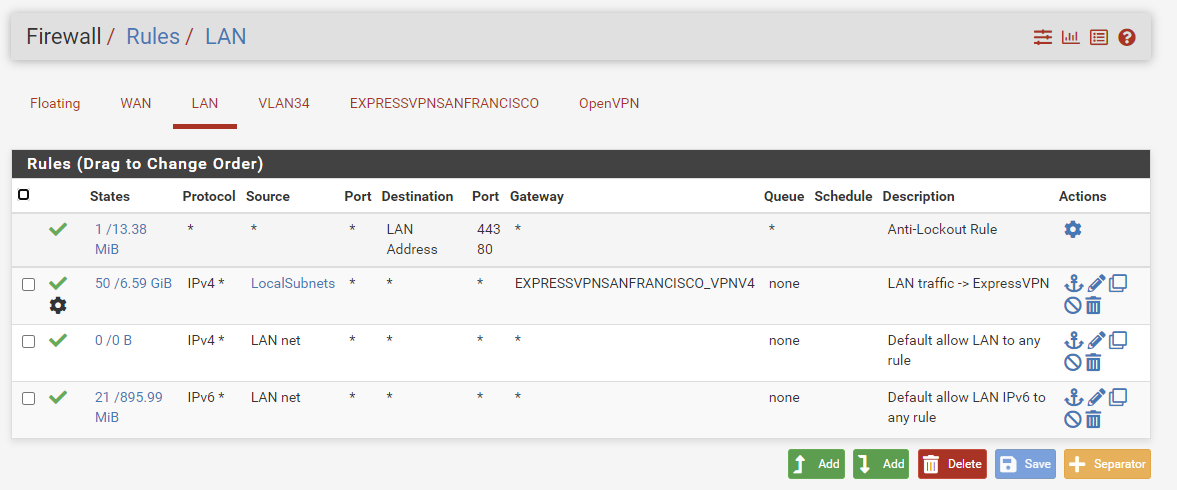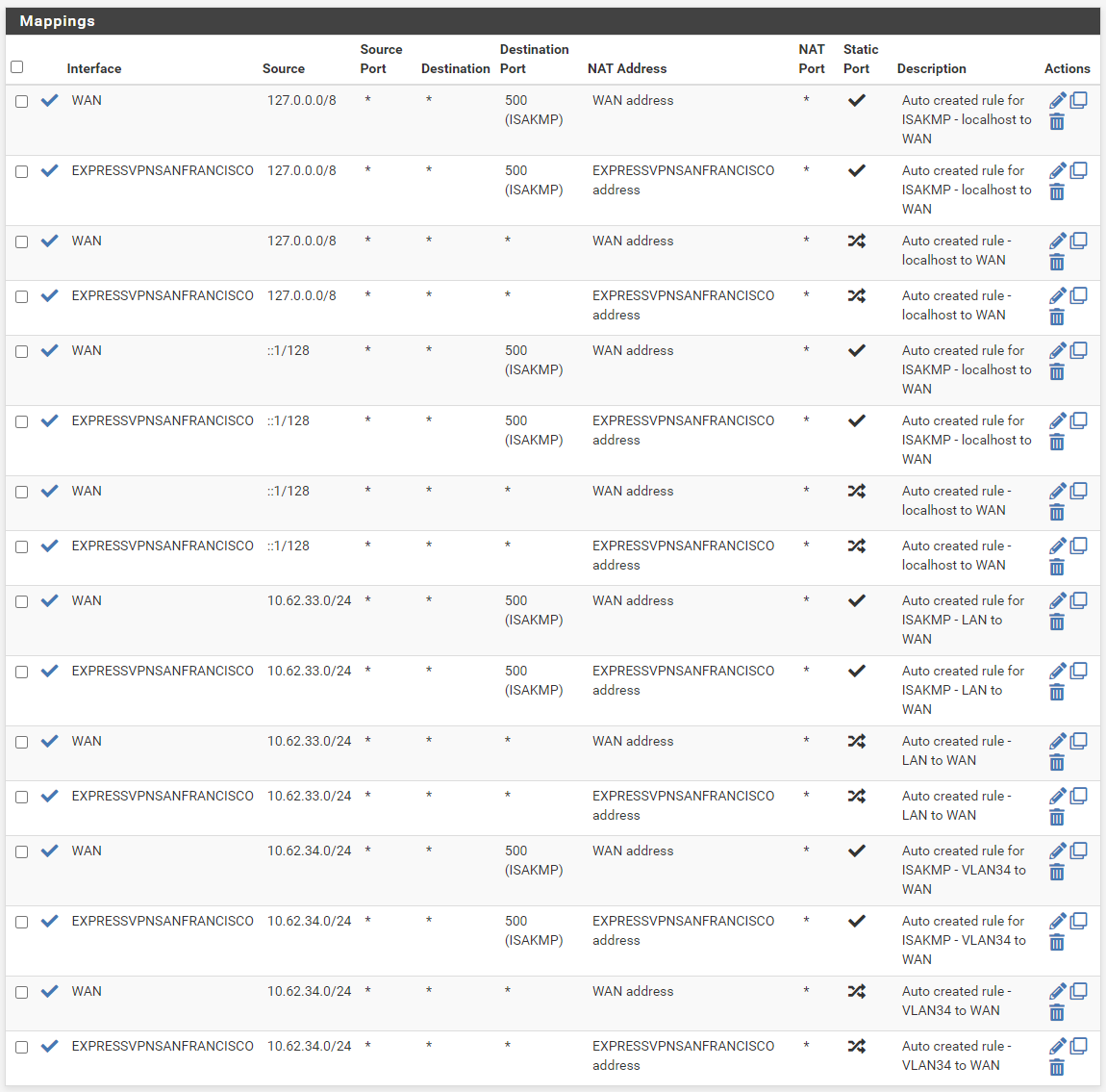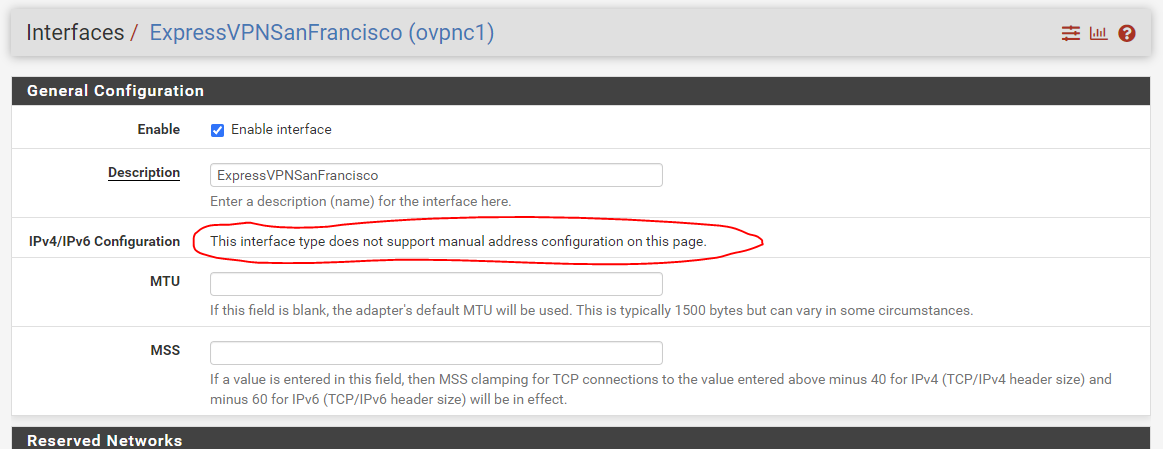pfsense 2.5.2: ExpressVPN connection working by gateway has 100% packet loss
-
Well, after upgrading to 2.5.2 and explicitly turning my TP-Link DHCP server off (from Auto) and restarting everything, the gateways are now in indefinite "Pending" mode. I'm out of ideas. Yourself?
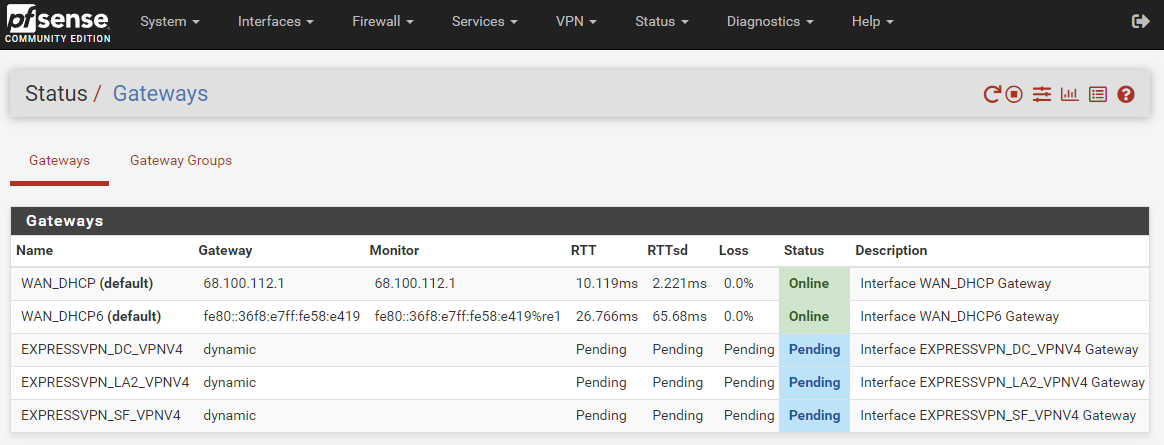
-
How many Expr*ssVPN clients have you running ?

Concentrate one one, then add others if needed.
I know Expr**sVPN offers 5 ( ?) simulations connections - dono if they accept 5 from the same device.Now you have 2.5.2, get your client opvn file and post it here. I'll compare yours with mine.
-
Alright, I'll disable two of the interfaces and the OpenVPN clients that use them.
While waiting on the gateways to work themselves out, here's my config.ovpn file, unaltered in any way. It looks like upgrading to 2.5.2 changed how the config files were stored, and now I have the file structure that you had expected in prior posts.
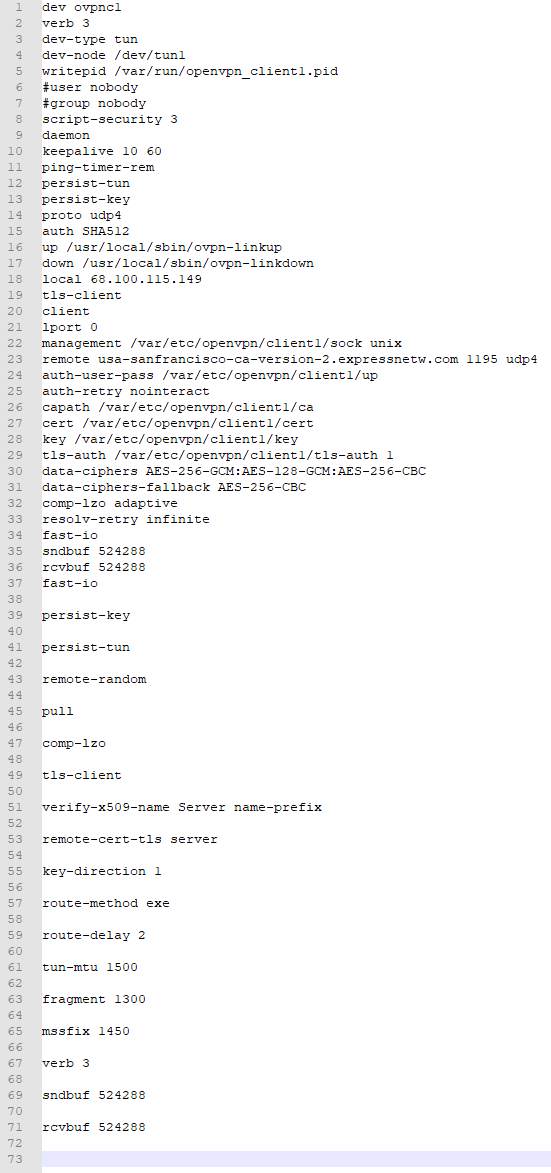
-
I compared you opvn file with mine.
There is 1 ( one ) difference :
local 192.168.10.3
for me, as me WAN IP is 192.168.10.3 - I have an up stream ISP router.
You have a 'real' WAN IP 68.100.115.1x9 - That must be the IP of your WAN interface.My opvn file :
dev ovpnc2 verb 3 dev-type tun dev-node /dev/tun2 writepid /var/run/openvpn_client2.pid #user nobody #group nobody script-security 3 daemon keepalive 10 60 ping-timer-rem persist-tun persist-key proto udp4 auth SHA512 up /usr/local/sbin/ovpn-linkup down /usr/local/sbin/ovpn-linkdown local 192.168.10.3 tls-client client lport 0 management /var/etc/openvpn/client2/sock unix remote usa-sanfrancisco-ca-version-2.expressnetw.com 1195 udp4 auth-user-pass /var/etc/openvpn/client2/up auth-retry nointeract capath /var/etc/openvpn/client2/ca cert /var/etc/openvpn/client2/cert key /var/etc/openvpn/client2/key tls-auth /var/etc/openvpn/client2/tls-auth 1 data-ciphers AES-256-GCM:AES-128-GCM:CHACHA20-POLY1305:AES-256-CBC data-ciphers-fallback AES-256-CBC allow-compression asym comp-lzo adaptive resolv-retry infinite fast-io sndbuf 524288 rcvbuf 524288 fast-io remote-random pull comp-lzo verify-x509-name Server name-prefix remote-cert-tls server key-direction 1 route-method exe route-delay 2 tun-mtu 1500 fragment 1300 mssfix 1450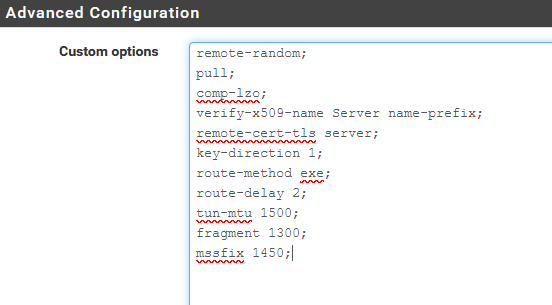
You'll see :
comp-lzo adaptive
and then
comp-lzo
in the custom option box.The latter cancels / modifies the first, I guess.
Do not forget to add the ";".
Now, when I remove the check from 'disable' at the top, and "save" I have these logs :
Logs are in reverse order : the connection sequence starts at the bottom :2022-01-11 08:40:16.087396+01:00 openvpn 73688 Initialization Sequence Completed 2022-01-11 08:40:16.087382+01:00 openvpn 73688 WARNING: this configuration may cache passwords in memory -- use the auth-nocache option to prevent this 2022-01-11 08:40:16.086402+01:00 openvpn 73688 /sbin/route add -net 10.46.0.1 10.46.0.133 255.255.255.255 2022-01-11 08:40:16.085418+01:00 openvpn 73688 /sbin/route add -net 128.0.0.0 10.46.0.133 128.0.0.0 2022-01-11 08:40:16.084447+01:00 openvpn 73688 /sbin/route add -net 0.0.0.0 10.46.0.133 128.0.0.0 2022-01-11 08:40:16.083229+01:00 openvpn 73688 /sbin/route add -net 45.38.178.184 192.168.10.1 255.255.255.255 2022-01-11 08:40:14.426692+01:00 openvpn 73688 /usr/local/sbin/ovpn-linkup ovpnc2 1500 1557 10.46.0.134 10.46.0.133 init 2022-01-11 08:40:14.421989+01:00 openvpn 73688 /sbin/ifconfig ovpnc2 10.46.0.134 10.46.0.133 mtu 1500 netmask 255.255.255.255 up 2022-01-11 08:40:14.421967+01:00 openvpn 73688 TUN/TAP device /dev/tun2 opened 2022-01-11 08:40:14.421881+01:00 openvpn 73688 TUN/TAP device ovpnc2 exists previously, keep at program end 2022-01-11 08:40:14.421846+01:00 openvpn 73688 ROUTE_GATEWAY 192.168.10.1/255.255.255.0 IFACE=em0 HWADDR=00:15:17:77:d1:19 2022-01-11 08:40:14.421717+01:00 openvpn 73688 Incoming Data Channel: Cipher 'AES-256-GCM' initialized with 256 bit key 2022-01-11 08:40:14.421688+01:00 openvpn 73688 Outgoing Data Channel: Cipher 'AES-256-GCM' initialized with 256 bit key 2022-01-11 08:40:14.421585+01:00 openvpn 73688 Data Channel: using negotiated cipher 'AES-256-GCM' 2022-01-11 08:40:14.421576+01:00 openvpn 73688 OPTIONS IMPORT: data channel crypto options modified 2022-01-11 08:40:14.421559+01:00 openvpn 73688 OPTIONS IMPORT: adjusting link_mtu to 1629 2022-01-11 08:40:14.421547+01:00 openvpn 73688 OPTIONS IMPORT: peer-id set 2022-01-11 08:40:14.421535+01:00 openvpn 73688 OPTIONS IMPORT: --ip-win32 and/or --dhcp-option options modified 2022-01-11 08:40:14.421524+01:00 openvpn 73688 OPTIONS IMPORT: route options modified 2022-01-11 08:40:14.421512+01:00 openvpn 73688 OPTIONS IMPORT: --ifconfig/up options modified 2022-01-11 08:40:14.421496+01:00 openvpn 73688 OPTIONS IMPORT: compression parms modified 2022-01-11 08:40:14.421479+01:00 openvpn 73688 OPTIONS IMPORT: timers and/or timeouts modified 2022-01-11 08:40:14.421389+01:00 openvpn 73688 PUSH: Received control message: 'PUSH_REPLY,redirect-gateway def1,dhcp-option DNS 10.46.0.1,comp-lzo no,route 10.46.0.1,topology net30,ping 10,ping-restart 60,ifconfig 10.46.0.134 10.46.0.133,peer-id 56,cipher AES-256-GCM' 2022-01-11 08:40:14.260127+01:00 openvpn 73688 SENT CONTROL [Server-10448-0a]: 'PUSH_REQUEST' (status=1) 2022-01-11 08:40:13.011214+01:00 openvpn 73688 [Server-10448-0a] Peer Connection Initiated with [AF_INET]45.38.178.184:1195 2022-01-11 08:40:13.011195+01:00 openvpn 73688 Control Channel: TLSv1.3, cipher TLSv1.3 TLS_AES_256_GCM_SHA384, peer certificate: 2048 bit RSA, signature: RSA-SHA256 2022-01-11 08:40:12.834914+01:00 openvpn 73688 VERIFY OK: depth=0, C=VG, ST=BVI, O=ExpressVPN, OU=ExpressVPN, CN=Server-10448-0a, emailAddress=support@expressvpn.com 2022-01-11 08:40:12.834906+01:00 openvpn 73688 VERIFY X509NAME OK: C=VG, ST=BVI, O=ExpressVPN, OU=ExpressVPN, CN=Server-10448-0a, emailAddress=support@expressvpn.com 2022-01-11 08:40:12.834897+01:00 openvpn 73688 VERIFY EKU OK 2022-01-11 08:40:12.834887+01:00 openvpn 73688 ++ Certificate has EKU (str) TLS Web Server Authentication, expects TLS Web Server Authentication 2022-01-11 08:40:12.834874+01:00 openvpn 73688 Validating certificate extended key usage 2022-01-11 08:40:12.834861+01:00 openvpn 73688 VERIFY KU OK 2022-01-11 08:40:12.834393+01:00 openvpn 73688 VERIFY OK: depth=1, C=VG, ST=BVI, O=ExpressVPN, OU=ExpressVPN, CN=ExpressVPN CA, emailAddress=support@expressvpn.com 2022-01-11 08:40:12.834281+01:00 openvpn 73688 VERIFY WARNING: depth=1, unable to get certificate CRL: C=VG, ST=BVI, O=ExpressVPN, OU=ExpressVPN, CN=ExpressVPN CA, emailAddress=support@expressvpn.com 2022-01-11 08:40:12.834232+01:00 openvpn 73688 VERIFY WARNING: depth=0, unable to get certificate CRL: C=VG, ST=BVI, O=ExpressVPN, OU=ExpressVPN, CN=Server-10448-0a, emailAddress=support@expressvpn.com 2022-01-11 08:40:12.669575+01:00 openvpn 73688 TLS: Initial packet from [AF_INET]45.38.178.184:1195, sid=afc6b917 2da3d51c 2022-01-11 08:40:12.507340+01:00 openvpn 73688 UDPv4 link remote: [AF_INET]45.38.178.184:1195 2022-01-11 08:40:12.507290+01:00 openvpn 73688 UDPv4 link local (bound): [AF_INET]192.168.10.3:0 2022-01-11 08:40:12.507235+01:00 openvpn 73688 Socket Buffers: R=[42080->524288] S=[57344->524288] 2022-01-11 08:40:12.507137+01:00 openvpn 73688 TCP/UDP: Preserving recently used remote address: [AF_INET]45.38.178.184:1195 2022-01-11 08:40:12.428036+01:00 openvpn 73688 Incoming Control Channel Authentication: Using 512 bit message hash 'SHA512' for HMAC authentication 2022-01-11 08:40:12.428014+01:00 openvpn 73688 Outgoing Control Channel Authentication: Using 512 bit message hash 'SHA512' for HMAC authentication 2022-01-11 08:40:12.427759+01:00 openvpn 73688 WARNING: experimental option --capath /var/etc/openvpn/client2/ca 2022-01-11 08:40:12.426711+01:00 openvpn 73688 NOTE: the current --script-security setting may allow this configuration to call user-defined scripts 2022-01-11 08:40:12.426487+01:00 openvpn 73688 MANAGEMENT: unix domain socket listening on /var/etc/openvpn/client2/sock 2022-01-11 08:40:12.425588+01:00 openvpn 73485 library versions: OpenSSL 1.1.1k-freebsd 25 Mar 2021, LZO 2.10 2022-01-11 08:40:12.425575+01:00 openvpn 73485 OpenVPN 2.5.2 amd64-portbld-freebsd12.2 [SSL (OpenSSL)] [LZO] [LZ4] [MH/RECVDA] [AEAD] built on Jun 24 2021 2022-01-11 08:40:12.425550+01:00 openvpn 73485 WARNING: file '/var/etc/openvpn/client2/up' is group or others accessible 2022-01-11 08:40:12.425218+01:00 openvpn 73485 WARNING: Compression for receiving enabled. Compression has been used in the past to break encryption. Sent packets are not compressed unless "allow-compression yes" is also set.There are some warnings about "Compression" - Not important right now (?).
WARNING: experimental option : nice, we want to experiment.
two "VERIFY WARNING" for the CRL : we don't care.
And a "WARNING: this configuration may cache" because we're lazy, so ok.
Do you have exactly the same log lines ?
( using "verb 3" means log level 3 - the default ) -
@gertjan
I changed my custom options to match yours, and then looked at Status -> System Logs -> OpenVPN.Noticing
AUTH_FAILED. That's clearly bad.Note: This is just one
AUTH_FAILEDcycle. The full logs repeat this log segment many times.Jan 11 18:09:57 openvpn 56223 NOTE: the current --script-security setting may allow this configuration to call user-defined scripts Jan 11 18:09:57 openvpn 56223 Outgoing Control Channel Authentication: Using 512 bit message hash 'SHA512' for HMAC authentication Jan 11 18:09:57 openvpn 56223 Incoming Control Channel Authentication: Using 512 bit message hash 'SHA512' for HMAC authentication Jan 11 18:09:57 openvpn 56223 TCP/UDP: Preserving recently used remote address: [AF_INET]45.38.178.54:1195 Jan 11 18:09:57 openvpn 56223 Socket Buffers: R=[42080->524288] S=[57344->524288] Jan 11 18:09:57 openvpn 56223 UDPv4 link local (bound): [AF_INET]68.100.115.149:0 Jan 11 18:09:57 openvpn 56223 UDPv4 link remote: [AF_INET]45.38.178.54:1195 Jan 11 18:09:57 openvpn 56223 TLS: Initial packet from [AF_INET]45.38.178.54:1195, sid=6cbc8ab5 ec9e0d58 Jan 11 18:09:57 openvpn 56223 VERIFY WARNING: depth=0, unable to get certificate CRL: C=VG, ST=BVI, O=ExpressVPN, OU=ExpressVPN, CN=Server-10457-0a, emailAddress=support@expressvpn.com Jan 11 18:09:57 openvpn 56223 VERIFY WARNING: depth=1, unable to get certificate CRL: C=VG, ST=BVI, O=ExpressVPN, OU=ExpressVPN, CN=ExpressVPN CA, emailAddress=support@expressvpn.com Jan 11 18:09:57 openvpn 56223 VERIFY OK: depth=1, C=VG, ST=BVI, O=ExpressVPN, OU=ExpressVPN, CN=ExpressVPN CA, emailAddress=support@expressvpn.com Jan 11 18:09:57 openvpn 56223 VERIFY KU OK Jan 11 18:09:57 openvpn 56223 Validating certificate extended key usage Jan 11 18:09:57 openvpn 56223 ++ Certificate has EKU (str) TLS Web Server Authentication, expects TLS Web Server Authentication Jan 11 18:09:57 openvpn 56223 VERIFY EKU OK Jan 11 18:09:57 openvpn 56223 VERIFY X509NAME OK: C=VG, ST=BVI, O=ExpressVPN, OU=ExpressVPN, CN=Server-10457-0a, emailAddress=support@expressvpn.com Jan 11 18:09:57 openvpn 56223 VERIFY OK: depth=0, C=VG, ST=BVI, O=ExpressVPN, OU=ExpressVPN, CN=Server-10457-0a, emailAddress=support@expressvpn.com Jan 11 18:09:57 openvpn 56223 Control Channel: TLSv1.3, cipher TLSv1.3 TLS_AES_256_GCM_SHA384, peer certificate: 2048 bit RSA, signature: RSA-SHA256 Jan 11 18:09:57 openvpn 56223 [Server-10457-0a] Peer Connection Initiated with [AF_INET]45.38.178.54:1195 Jan 11 18:09:58 openvpn 56223 SENT CONTROL [Server-10457-0a]: 'PUSH_REQUEST' (status=1) Jan 11 18:09:58 openvpn 56223 AUTH: Received control message: AUTH_FAILED Jan 11 18:09:58 openvpn 56223 SIGUSR1[soft,auth-failure] received, process restarting Jan 11 18:09:58 openvpn 56223 Restart pause, 10 second(s)And the gateway is still pending:

-
@amdreallyfast said in pfsense 2.5.2: ExpressVPN connection working by gateway has 100% packet loss:
This is just one AUTH_FAILED cycle
That's a matter of copying correctly your credentials.
Was this message there all the time ?
This is the most logical reason the connection doesn't come up : your bank site won't let you in neither with wrong credentials..This issue wasn't worth mentioning, as it is easy to correct.

edit : in the folder where you found the opvn client file, you will also find a file called 'up'.
Open it ;)
This explains this setting :auth-user-pass /var/etc/openvpn/client1/up@amdreallyfast said in pfsense 2.5.2: ExpressVPN connection working by gateway has 100% packet loss:
And the gateway is still pending
When the login is transmitted, and it's wrong, the "PUSH_REQUEST" will not receive the route, gateway, IP etc but an error message : you saw it.
The gateway isn't reachable, as you failed authentication.
When the "auth" went well, you receive aPUSH: Received control message: 'PUSH_REPLY,redirect-gateway def1,dhcp-option DNS 10.46.0.1,comp-lzo no,route 10.46.0.1,topology net30,ping 10,ping-restart 60,ifconfig 10.46.0.134 10.46.0.133,peer-id 56,cipher AES-256-GCM'
2022-01-11 08:40:14.260127+01:00 openvpn 73688 SENT CONTROL [Server-10448-0a]: 'PUSH_REQUEST' (status=1)and as you can see, the gateway, amongst others, is in there. pfSense uses all this info to set up everything.
-
Looks like it's working now. The auth problem was caused by an old username/password that went bad when the subscription recently expired. I just renewed it, entered the new username/password, and now the gateway is online.

Then I enabled the firewall rules and firewall NAT -> Outbound routing rules, and it looks like its my San Francisco VPN is now working and routing traffic correctly. I'm writing this post while my router is connected to the new VPN.
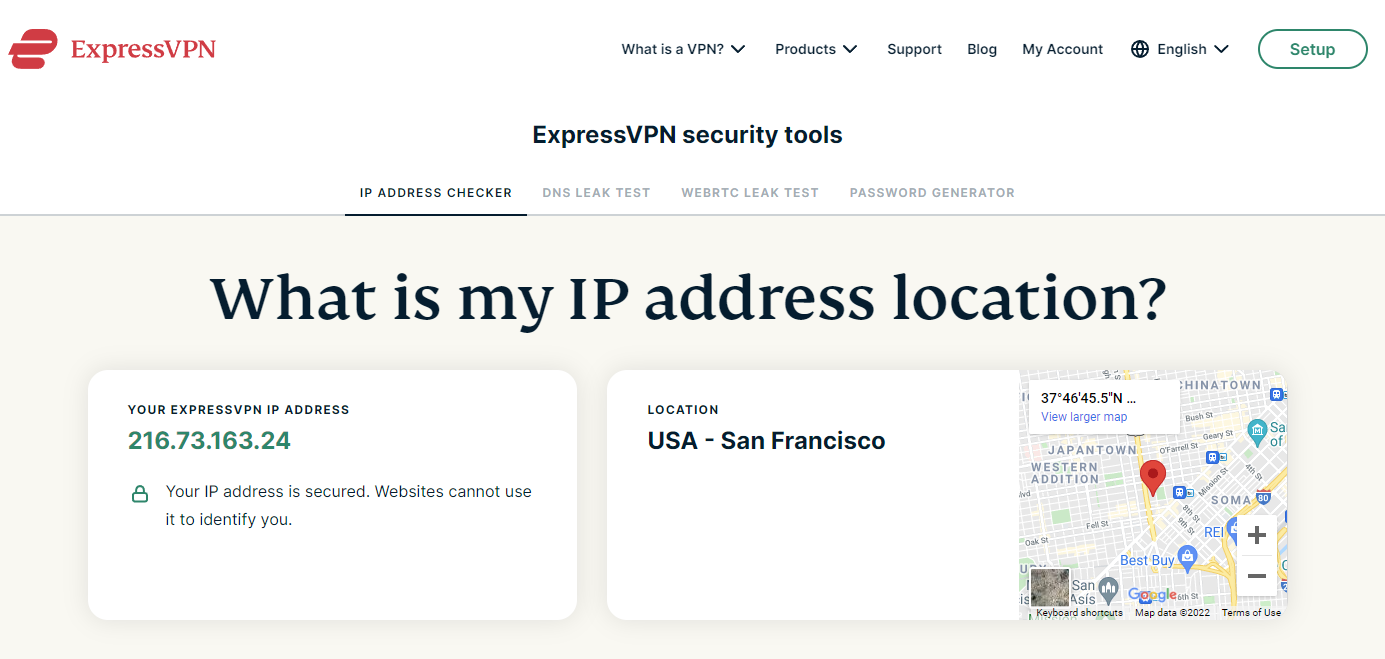
It looks like your settings worked for me too. I remember deviating from the ExpressVPN setup instructions in the VPN client setup by checking Enable NCP (2.4.5; on 2.5.2 it's called "Enable Data Encryption Negotiation") and by unchecking Don't pull routes", and by unchecking both Interfaces -> <vpn interface name> -> Reserved Networks -> Block private networks and loopback addresses and Block bogon networks. And I think that I edited the manual custom configuration options a bit so that they match yours. Current settings.
remote-random; pull; comp-lzo; verify-x509-name Server name-prefix; remote-cert-tls server; key-direction 1; route-method exe; route-delay 2; tun-mtu 1500; fragment 1300; mssfix 1450; verb 3; sndbuf 524288; rcvbuf 524288;Thanks for all the patience. Next I'll need to figure out custom routing rules for connections that don't like the VPN. Some places block it and I'll need to make exceptions for those.
-
@amdreallyfast
Sit back, and think with me :
What is different between these 'famous' Exprr*VPN instructions, and the ones needed to make VPN works with 2.5.2.
You'll agree with me : it's not much. Re see the post about this subject I made several month ( ? ) ago.
I'll have a look at it this weekend. -
You'll agree with me : it's not much.
True. The problem is that network software rarely settles for "close enough". Figuring out exactly what I needed to change was the rough part.
And now, curiously enough, the docs pages for pfsense won't load. It's like my firewall (or maybe theirs) is blocking me. Back to the non-VPN configuration while I try to figure out how to pass traffic for certain websites through the non-VPN connection.
-
I had expressvpn running on 2.5.2 but it was very slow (SFO from Okinawa, Japan) also I could not change from SFO with ease. I finally installed expressvpn firmware on old external router. Tried to connect via pfsense vlan, many times, finally expressvpn help desk told me that expressvpn would not work via a vlan. Reinstalled pfsense, reinistalled pfblocker. Changed to opt1_dmz, configured new gateway and added new static address. Than I changed router from PPPoE to DHCP and expressvpn worked fine, in fact speed testing is as fast as non-vpn speeds and all expressvpn options are available. I use expressvpn for USA paid networks (prime, netflix, etc.) via wifi inside the house. wifi from expressvpn router. Your luck may be different. elmo
-
Thank you, the monitor IP (8.8.8.8) and compression is what I needed to make mine work!
